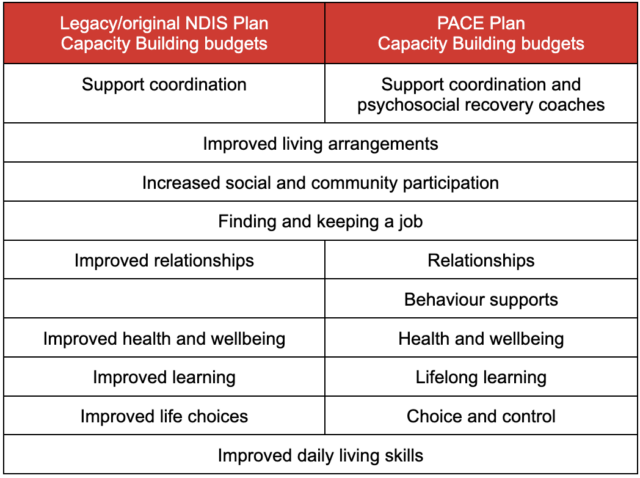You may notice within your NDIS Plan there’s funding allocated towards a section called Capacity Building… what does this mean and how do you get the most out of it?
Your NDIS Capacity Building budgets cover supports that improve your ability and increase skills to help you participate in the community, work, social and recreational activities.
Here we break down the budget categories for Capacity Building and take a closer look at what’s included.
Some Capacity Building budget names are changing.
There are several budget categories under Capacity Building. Their names depend on whether you’re on a legacy/original NDIS Plan or a PACE plan. Some names are different for people on PACE plans. The table below provides a quick summary of the old and new names.
For more information about the NDIS PACE changes, check out our dedicated page, PACE and changes to the NDIS.
Capacity Building budgets help you to become more independent.
Capacity Building supports are intended to help you achieve your goals by improving skills and independence. Below we summarise the Capacity Building support categories – you may receive funding for some of these in your NDIS Plan.
A note on naming: the PACE Plan name is in brackets.
Support coordination (Support coordination and psychosocial recovery coaches): Use this funding to work with a support coordinator who can help you to understand and implement any of the funded supports in your plan. They also help to link you to community, mainstream or other government services. Your support coordinator will connect you to providers and assist you to negotiate with them about what they will offer you and how much it will cost out of your plan.
For people on PACE plans, this support category can also include funding for psychosocial recovery coaches.
Improved living arrangements: This funding can be used to find shared or independent accommodation to suit your needs. You may choose to access a service provider that helps you look for somewhere to live, apply for a rental home or manage your rental agreement.
Increased social and community participation: This is all about making connections and getting to know your local community. It can fund various support services that help to develop your social skills, make new friends and access local community events or group activities.
Finding and keeping a job: Starting a new job is exciting but it can be really helpful to work with a provider who can assist with each of the stages of the recruitment process. This funding can cover things like support to look for a job, apply for jobs, update your resume and link you with supported employment and open employment opportunities. It can also be used to help you learn new skills in your current job.
Improved relationships (Relationships): Forming and maintaining positive relationships is an important part of life. This budget can be used for building social skills to participate in the community or social activity. It can also be used for behaviour management programs or to create a behaviour support plan that’s catered to your own individual needs. (Note that there is a separate category called Behaviour supports for people on PACE plans).
Behaviour supports (for PACE plans only): This dedicated category has been split from Improved relationships under the new NDIS system. Here you can find funding for behavioural management plans and specialist behavioral intervention supports if they’re including in your plan.
Improved health and wellbeing (Health and wellbeing): Perhaps one of your goals is to get healthier. Support services funded in this budget can help you to maintain a healthy lifestyle. This may include an appointment with a dietitian or a session with a personal trainer.
Improved learning (Lifelong learning): Are you looking to further your qualifications? Whether you’re wanting to study at university, TAFE or take on a traineeship, this funding can help. Funding in this section of your plan can be used to get help with your application, timetable planning or study budget. Or, it can be used to fund a support worker to accompany you to class.
Improved life choices (Choice and control): This is where your budget for plan management will be located.
Improved daily living skills: This includes therapy providers such as an occupational therapist or physiotherapist. You may choose to use this funding for support that helps to improve your day-to-day independence.
Making the most of your Capacity Building budgets.
The Capacity Building budgets support you to learn new skills that will help you to become more independent. You may not receive funding for all of these budget categories, so it’s important to think about the areas in your life that you want to improve the most and set some goals for these ahead of your plan meeting or reassessment.
For example, if your goal is to live independently then you could use Improved living arrangements funding to help secure a home that suits your needs. You could also utilise your Improved health and wellbeing funding to find a service provider that teaches you to cook healthy meals.
We can help!
Here at Leap in! HQ we want to help you achieve the most out of your NDIS Plan. If you’re still unsure if the funds within your Capacity Building budgets are doing the best they can for you, then have a chat with our crew.
Call us on 1300 05 78 78, email us at crew@leapin.com.au or sign up to Leap in! plan management today.
First published 21 February 2020, revised and updated 1 March 2024.
Further reading.
NDIS support categories explained.
Achieving your NDIS employment goals.
Housing and the NDIS: What your options are.

